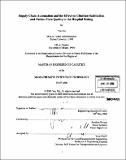Supply chain automation and the effects on clinician satisfaction and patient care quality in the hospital setting
Author(s)
Xie, Yue, M. Eng. Massachusetts Institute of Technology
DownloadFull printable version (3.248Mb)
Other Contributors
Massachusetts Institute of Technology. Engineering Systems Division.
Advisor
Jonathan Byrnes.
Terms of use
Metadata
Show full item recordAbstract
The healthcare industry, more specifically hospitals, has in recent times been experiencing a steady rise in nursing shortages and cost pressures. To offset these problems hospitals have increasingly relied upon supply chain automation and the use of Automated Point of Use systems (APU) to relieve nurses of their supply management responsibilities and allow them to focus more of their time on patient care, and therefore increase nursing job satisfaction and patient care quality. However, previous studies on the effectiveness of APUs have shown mixed results. It has been argued that nursing's attitude towards automation implementations plays a role in determining the success of new technologies adoption. This research, based on interviews conducted at BBC hospital, a well regarded multi-specialty academically affiliated institution, and with the help of its supply chain partner Primera, shows that nursing's perceived success of BBC's APU implementation depends on four factors - the ability of the new technology to show timesaving, the availability of supplies when needed, the accessibility of supplies when needed, and the perceived quality of the products supplied. (cont.) In sum, automation implementations must use workflow process changes to add tangible values that nursing perceives as helping nurses to perform their jobs better and with less stress. As for both the current BBC implementation and any future implementations, this study further recommends methods in achieving these values and therefore increasing nursing acceptance of new technology implementations.
Description
Thesis (M. Eng. in Logistics)--Massachusetts Institute of Technology, Engineering Systems Division, 2006. Includes bibliographical references (leaves 61-63).
Date issued
2006Department
Massachusetts Institute of Technology. Engineering Systems DivisionPublisher
Massachusetts Institute of Technology
Keywords
Engineering Systems Division.